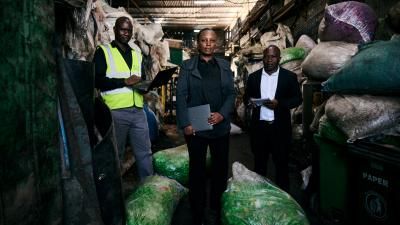Engineering X
Kenya.
This page is approximately a 3 minute read
This page was published on

Burning of waste is setting alight billions of dollars as this is a missed opportunity to protect the environment, sustain livelihoods, protect human health and reduce contribution to climate change.
Dr Andriannah Mbandi Waste Lead, United Nations High Level Climate Champion
A bold initiative for sustainable waste management in Africa
“In Africa, up to 90% of waste in cities is openly dumped and often burned, causing irreversible damage to people and the environment,” says Andriannah. “But in the absence of an effective waste management infrastructure, what choice do people have?”
Andriannah, the Waste Lead for United Nations High Level Climate Champions (UNHLC), leads a team of scientists that began working in partnership with Engineering X in 2021 to find a solution to the open burning of waste, with an initial focus on Africa. Founded by the Royal Academy of Engineering and Lloyd’s Register Foundation, Engineering X is an international collaboration that brings together some of the world’s leading problem-solvers to address the great challenges of our age. Engineering X and the United Nations High Level Climate Champions, along with other key partners, have been working together to introduce and elevate the open burning of waste onto the agenda of high-level discussions worldwide.
“From the first moments, our team knew that partnership was the only way to end an unsafe practice that has been going on for centuries,” explains Andriannah, who took over as project lead in January 2023. “By bringing together NGOs and civil society, alongside public and private sector entities – including those informal groups that currently handle waste, often by burning – we’ve already made excellent progress. Together, we’ve bought the issue to the front of minds everywhere in major global and regional forums, including the African Ministerial Conference on Environment, and the 26th and 27th UN Climate Change Conferences.”
Achievements to date include a resolution by governments across Africa, following the 18th African Ministerial Conference on Environment, to reduce the open burning of waste by 60% by 2030 and to eliminate it completely by 2040. The project has now gathered real momentum, highlighted by the launch of a new multi stakeholder partnership led by the African Ministerial Conference on the Environment, United Cities and Local Governments of Africa, Engineering X and UNHLC at COP 27 in November 2022.
“The ownership of this project now sits squarely with our partners,” adds Professor Desta Mebratu of Stellenbosch University, who led the project until the end of 2022. “It’s quite tremendous to see this level of support from stakeholders right across Africa. We have momentum, we have goodwill and – with the backing of Engineering X – we have the resources to help bring people and organisations together to work towards ending this practice and prevent more impact on health, safety and the environment.”
United Nations High-Level Champions
The United Nations High-Level Champions (UNHLC) for Climate Action was established at COP21 and has a UN mandate to work with the non-state actor community (businesses, investors, cities, regions and civil society) to strengthen ambition, accelerate action and facilitate collaboration between parties and non-parties to achieve the goals of the Paris Agreement. The UNHLC launched the following two flagship initiatives with the objective of fulfilling its mandate.
•The Race to Zero1¹: A global campaign to rally leadership and support to secure commitment of state and nonstate actors to achieving zero emissions as soon as possible - and by 2050 at the very latest; and
•The Race to Resilience2: Aims to catalyse action by non-state actors that builds the resilience of four billion people from groups and communities who are vulnerable to climate risks by 2030. The decommissioning, dismantling and disposal of products and structures at the end of their life can damage the environment and squander scarce resources if not carried out responsibly.
- 1
For more information, you may visit: https://racetozero.unfccc.int/
- 2
For more information, you may visit: https://racetozero. unfccc.int/race-to-resilience-launches/.
Continue reading
University of Southampton
Our Heritage Centre's unique collection offers researchers a chance to use historic data to inform the future of maritime safety.
Read previous articleSafetyknot
Safetyknot provides culturally tailored safety training to prevent injuries in low-income countries, reaching 7,000+ people with support from the Foundation.
Read next article
